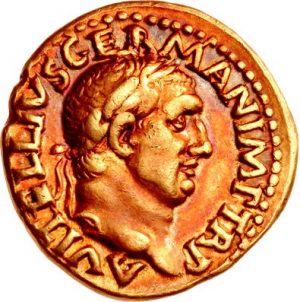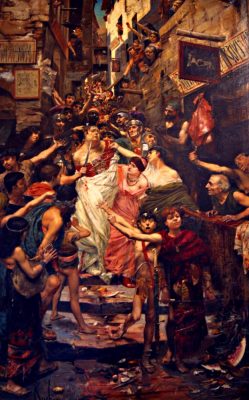Aulus Vitellius was the third Roman emperor in the Year of the Four Emperors, quickly seizing power after the deaths of Galba and Otho in AD 69. However, he was not fully accepted by the Romans as emperor and ruled for only 8 months before dying in a barbaric manner at the hands of Vespasian’s supporters. Aside from his swift rise to the throne, he is known for being a gluttonous, obese drunkard who indulged in feasts and gambling. He was generous to his soldiers which only caused them to act unruly. In his early years, he was in the good graces of three previous emperors, namely Caligula, Claudius, and Nero.
Family Life and Background
Lucius Vitellius and Sextilia gave birth to two sons; the first was Aulus Vitellius and the second passed away right after he was born. He came from the Roman family of gens Vitellia which had two accounts about its origin. One account was that the family were descendants of Latium rulers while the other account described the clan as lowly in origin.
Lucius Vitellius was poised as the respectable consul three times and also held the position of co-consul during the time of emperor Claudius. Notably, he also governed Syria and later on, in AD 48, Aulus Vitellius would hold the rank of consul.
Aulus Vitellius married two times. In AD 40, he wed Petronia, who came from a rich lineage. She bore him a son, Aulus Vitellius Petrionius who became the heir of his wife’s massive wealth and was blind in one eye. He had his son murdered in 69 AD to obtain the fortune. In AD 50, Vitellius married Galeria Fundana, who gave birth to a son named Aulus Vitellius Germanicus and a daughter named Vitellia.
Political and Military Career
Vitellius grew up in Capri with Tiberius Caesar Augustus, the second Roman emperor. He was adept at gaining the favor of emperors through his skills in various events. He befriended Caligula due to his charioteering and Claudius through his dice playing. After which, he became close to Nero who valued both activities.
His father’s high rank as consul gave him the advantage to rise in the ranks as well, becoming a quaestor when he was 25 years old. He then became a praetor when he was 45 years old. Both times he was younger than most who achieved the rank. His friendships with Caligula and then Claudius helped him in his endeavors.
In AD 48, Vitellius became consul and then proconsul of Africa in AD 60. Perhaps due to his limited military track record, Halba gave him the title of governor of Lower Germany in AD 68. Galba made this decision due to Vitellius’ reputation as a glutton and drunkard which made him comfortable that Vitellius would not rise against him.
Galba was unable to foresee the popularity of Vitellius in Lower Germany with his generous feasts, winning him supporters. On the other hand, Galba was seen as too severe, making strict decisions to regain Rome’s fortunes. This was ultimately his downfall as the Praetorian Guard betrayed him in favor of Otho, who later on fell to Vitellius.
Vitellius was able to take the throne due to the commanders Aulus Caecina Severus and Fabius Valens of the Rhine legions. They used Aulus Vitellius as their figurehead, rejecting Galba as their emperor and naming Vitellius as the emperor of Germania. Armies rallied behind him from Brittania, Gaul, and Raetia to march to Rome and defeat Galba. At that point, Otho had already had Galba killed thus changing the army’s target.
The haste of Otho’s army along with the mild winter which allowed easy access to Italy won Vitellius and his soldiers the Battle of Bedriacum. Otho then committed suicide to lessen the bloodshed. Vitellius was then accepted by the Senate in Rome as the new emperor but he was not acknowledged by the whole Roman population. He filled Rome with excess, eating at four banquets a day and encouraging gladiatorial shows, riots, and massacres.
Reign
Vitellius’ administration reflected his intention to govern effectively but his lifestyle was centered on luxury and unjustness.
The events that marked his rule were that he ended the use of centurions that sold exemptions and furloughs. He also brought Equites into the fold of Imperial civil service and banished astrologers from Italy and Rome on 1 October 69. Vitellius kept Otho’s commemoration of Nero in the palace and policies. Lower classes had positive regard for Vitellius due to his honoring of Nero.
Downfall
Aside from Vitellius’ excesses, he was held in a favorable light, but in July 69 the soldiers in eastern provinces chose to stand by a different emperor: Titus Flavius Vesparianus. Vesparainus commanded the eastern provinces and won the devotion of the armies from the Dalmatia, the East, and Illyricum. Vitellius responded by instructing Caecina to lead several legions to stop Vesparainus’ armies from breaching Italy. However, Caecina was frustrated with Vitellius’ governing, so he attempted to defect to Vespasian, but failed. Caecina disapproved of Vitellius’ rule greatly demoralized his troops, resulting in a defeat at the Second Battle of Bedriacum.
Vitellius instructed Fabius Valens to gather supporters in Gaul, but they remained faithful to Vespasian, and Valens was executed. Vitellius, weak and without resources, was ready to abdicate his position as emperor.
Death
The agreement on the abdication was supposed to be handled by Marcus Antonius Primus, one of Vespasian’s highly ranked supporters, the commander of Pannonia’s sixth legion. On his journey to the Temple of Concord to provide the empire’s insignia, he was forced to return to the palace by the Praetorian Guard.
Many civilians who were loyal to Vitellius and other supporters engaged in a bloody battle when Vespasian’s armies entered Italy. They did not want Vitellius to abdicate the throne fearing their fates if Vespasian rose to the throne. Numerous areas of Rome were destroyed by the fight.
In the chaos, Vitellius was brought to a secret location to be killed by Vespasian’s soldiers and he was dragged onto the streets of Rome and tortured. The retelling of Cassius Dio reveals he was beheaded and his head was shown off in a procession throughout Rome. He died on 20 December 69, ending his reign after 8 months.
Historians Who Covered Vitellius’ Life
The accounts about Vitellius are from three main sources: Seutonius the biographer, Tacitus the historian, and Cassius Dio who was another famous historian of his time. Their writings about Vitellius were skewed towards the negative side, throwing hostility regarding Vitellius’ gluttonous nature.

